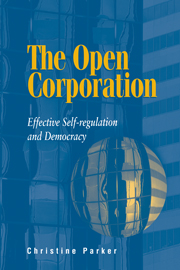Book contents
- Frontmatter
- Contents
- List of tables and figures
- Preface
- Acknowledgements
- 1 Introduction: Corporate self-regulation in the new regulatory State
- 2 The potential for self-regulation
- 3 Motivating top-management commitment to self-regulation
- 4 Cultivating self-regulation leadership
- 5 Self-regulation methodology and social harmony
- 6 The pathologies of self-regulation
- 7 Model corporate Citizens: The role of self-regulation Professionals
- 8 The three strategies of ‘permeability’ in the open Corporation
- 9 Meta-regulation: The regulation of self-regulation
- 10 Conclusion
- Appendix: Methodology
- Notes
- Reference
- Index
8 - The three strategies of ‘permeability’ in the open Corporation
Published online by Cambridge University Press: 05 July 2014
- Frontmatter
- Contents
- List of tables and figures
- Preface
- Acknowledgements
- 1 Introduction: Corporate self-regulation in the new regulatory State
- 2 The potential for self-regulation
- 3 Motivating top-management commitment to self-regulation
- 4 Cultivating self-regulation leadership
- 5 Self-regulation methodology and social harmony
- 6 The pathologies of self-regulation
- 7 Model corporate Citizens: The role of self-regulation Professionals
- 8 The three strategies of ‘permeability’ in the open Corporation
- 9 Meta-regulation: The regulation of self-regulation
- 10 Conclusion
- Appendix: Methodology
- Notes
- Reference
- Index
Summary
The previous chapters followed through the first two phases of corporate responsiveness to social and legal responsibility issues: management commitment, and the acquisition of self-regulatory skills and knowledge. This chapter moves to the third phase: the institutionalization of responsibility in corporate self-regulation. Responsible companies do not simply layer a compliance System onto pre-existing management processes and corporate cultures. Rather, responsibility is internalized when the whole corporation is opened up to a broader deliberative democracy. This is not to say that business corporations should be democratic. Their management should, however, be permeable to democracy through three strategies:
Strategy One: Responsible corporate self-regulators use employees' cultures, values and self-identities to build organizational integrity. This is a ‘bottom-up’ approach to self-regulation.
Strategy Two: Responsible corporate self-regulators find it is Strategie to take legitimate stakeholder perspectives and external values into account, by reporting information about self-regulation processes and Performance to stakeholders, by Consulting with stakeholders, and by giving those affected by corporate power the ability to challenge corporate decisions and actions. This is an ‘opening-out’ approach to self-regulation in which stakeholder concerns and values have become an internal issue to be decisively addressed, not an externality to be ignored.
Strategy Three: Responsible corporate self-regulators integrate into their routine management Systems institutions and decision-making processes that ensure that the Company becomes aware of, learns from and responds to social and legal responsibility issues.
- Type
- Chapter
- Information
- The Open CorporationEffective Self-regulation and Democracy, pp. 197 - 244Publisher: Cambridge University PressPrint publication year: 2002



